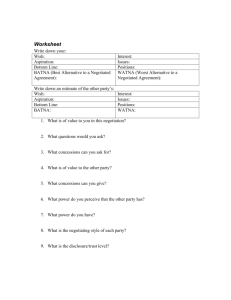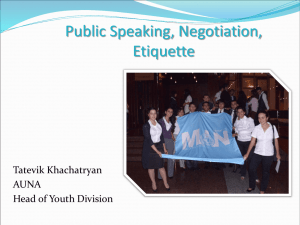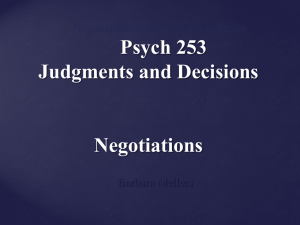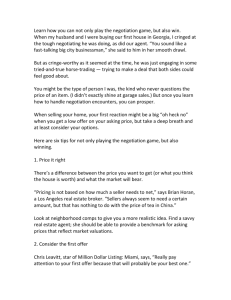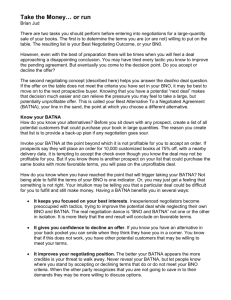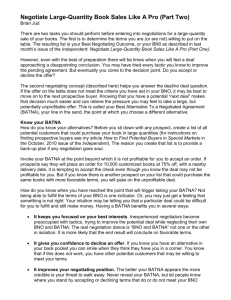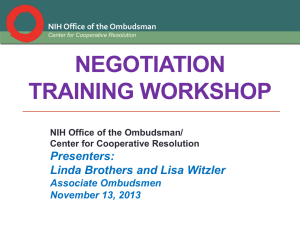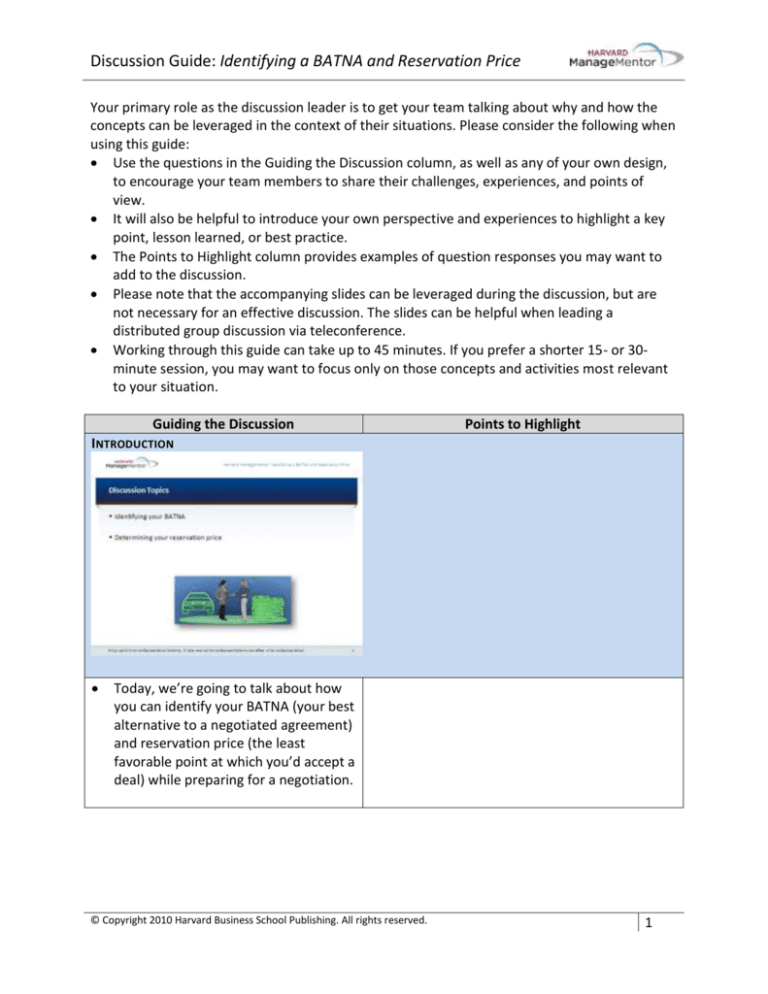
Discussion Guide: Identifying a BATNA and Reservation Price
Your primary role as the discussion leader is to get your team talking about why and how the
concepts can be leveraged in the context of their situations. Please consider the following when
using this guide:
Use the questions in the Guiding the Discussion column, as well as any of your own design,
to encourage your team members to share their challenges, experiences, and points of
view.
It will also be helpful to introduce your own perspective and experiences to highlight a key
point, lesson learned, or best practice.
The Points to Highlight column provides examples of question responses you may want to
add to the discussion.
Please note that the accompanying slides can be leveraged during the discussion, but are
not necessary for an effective discussion. The slides can be helpful when leading a
distributed group discussion via teleconference.
Working through this guide can take up to 45 minutes. If you prefer a shorter 15- or 30minute session, you may want to focus only on those concepts and activities most relevant
to your situation.
Guiding the Discussion
Points to Highlight
INTRODUCTION
Today, we’re going to talk about how
you can identify your BATNA (your best
alternative to a negotiated agreement)
and reservation price (the least
favorable point at which you’d accept a
deal) while preparing for a negotiation.
© Copyright 2010 Harvard Business School Publishing. All rights reserved.
1
Discussion Guide: Identifying a BATNA and Reservation Price
Guiding the Discussion
IDENTIFYING YOUR BATNA (20 MINUTES)
Points to Highlight
To identify your BATNA, we’ll select a
negotiation to work with as an
example. It could be an upcoming
negotiation our team is facing, or one
that you’ve handled in the past where
you didn’t identify your BATNA and
reservation price.
We’ll then brainstorm alternatives to a
negotiated agreement for our example
deal and select the best alternative.
And we’ll talk about ways to
strengthen your BATNA.
Note: You may opt to preselect a particular
negotiation for the team to use in discussing
these skills.
So, let’s pick an example negotiation to
work with. Does anyone have ideas
they want to suggest?
Note: The example negotiations your team
members suggest (upcoming ones or
negotiations they’ve worked on in the past)
will vary widely, depending on the team’s
function within the organization.
For illustrative purposes, the example
responses provided in the rest of this guide are
from a fictional team in a company that
provides marketing consulting services to
clients. The team is preparing to negotiate a
monthlong assignment with a potential client,
PowerTech.
Now let’s brainstorm a list of what our
alternatives would be if the negotiation
were to end without agreement.
Example responses:
o If the deal with PowerTech doesn’t
work out, we could spend that month
© Copyright 2010 Harvard Business School Publishing. All rights reserved.
2
Discussion Guide: Identifying a BATNA and Reservation Price
Guiding the Discussion
Who’d like to offer ideas?
Points to Highlight
developing those marketing studies we
promised BigTech. That work would pay
us $15,000.
o We could use that month to focus on
developing leads with other potential
new clients. That could generate future
business.
o If we don’t get PowerTech, we could
take time to tackle some challenges
we’ve put on the back burner for a
while — like clarifying our strategy and
improving some business processes.
Of all the alternatives we’ve listed,
which of them strikes you as the best?
Why?
Example response:
o Spending the month developing the
marketing studies we promised BigTech
seems the best alternative, because it’s
guaranteed money in the bank. Our
cash flow hasn’t been great lately, so it
would be good to keep the money
coming in.
So you’ve identified your BATNA. But
it’s always good to ask whether your
BATNA is as strong as it can be. The
stronger your BATNA, the more you
can negotiate for even more favorable
terms, because you know you have
something even better to fall back on if
a deal can’t be arranged.
So let’s take a moment to talk about
whether your BATNA might be
strengthened at all. Who’d like to offer
an opinion on this?
Example response:
o We’ve got a pretty good BATNA:
$15,000 of guaranteed revenue from
BigTech that we can turn to if
negotiations with PowerTech don’t go
anywhere. But maybe we could expand
the BigTech work. We could call them
and offer to increase the scope of the
studies to include analyses of their two
leading competitors’ products. For that
additional work, we’d propose a slight
increase in the fee, say, $5,000. If we
got the go ahead from BigTech to
expand the project, our BATNA would
be $20,000 instead of $15,000.
© Copyright 2010 Harvard Business School Publishing. All rights reserved.
3
Discussion Guide: Identifying a BATNA and Reservation Price
Guiding the Discussion
DETERMINING Y OUR RESERVATION PRICE (20 MINUTES)
You’ve got a strong BATNA. Now let’s
talk about your reservation price — the
least favorable point at which you’d
accept a deal.
If the deal’s only about money, your
reservation price will be similar to your
BATNA.
But if the deal’s about more than
money, you’ll want to consider other
forms of value in arriving at your
reservation price.
Points to Highlight
Note: Consider providing an example from
your experience that demonstrates the
importance of having a reservation price.
So, what’s this deal about — just
money? Or are there other kinds of
value possibly on the table, too?
Who’d like to share some thoughts
about this?
Example responses:
o Well, it’s not really just about money.
There are other things to consider as
well. Making a deal with PowerTech
could lead to repeat business from
them later.
o PowerTech’s a well-respected company.
If we did some work for them, we could
list them in our client roster. That could
help us attract other big-name firms.
If there are other forms of value that
are important to you, what’s the least
favorable point where you’d accept a
deal in this negotiation?
Example response:
o Our BATNA’s $20,000. We might be
willing to do a project with PowerTech
for as little as $14,000 if we could be
pretty confident we’d get repeat
business from them as well as be able
© Copyright 2010 Harvard Business School Publishing. All rights reserved.
4
Discussion Guide: Identifying a BATNA and Reservation Price
Guiding the Discussion
Points to Highlight
to attract other clients.
NEXT STEPS
Take a moment to consider some of
the things you might do as a result of
our discussion today.
For example:
Think back to several negotiations you were
involved in previously, for which you didn’t
identify your BATNA or reservation price.
Imagine that you’re just now preparing for
those negotiations. Practice identifying a
BATNA and reservation price for each of those
deals.
As you prepare for upcoming negotiations
that weren’t featured in today’s discussion,
work with your colleagues to determine
BATNAs and reservation prices for those
deals. Use the Worksheet for Identifying and
Improving Your BATNA and the Worksheet
for Determining Your Reservation Price as
you prepare.
© Copyright 2010 Harvard Business School Publishing. All rights reserved.
5

